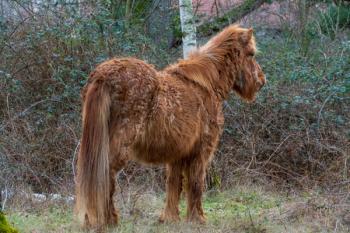
EEE surge blamed on economy
Lansing, Mich. - The effects of Michigan's woeful economy are far reaching. State unemployment is in the double digits, industries have been gutted, and horse owners may be failing to properly care for their animals in order to save a few bucks.
LANSING, MICH. — The effects of Michigan's woeful economy are far reaching. State unemployment is in the double digits, industries have been gutted, and horse owners may be failing to properly care for their animals in order save a few bucks.
A recent uptick in the number of Eastern Equine Encephalitis (EEE) cases has led Steve Halstead, the state veterinarian at the Michigan Department of Agriculture, to suggest that cash-strapped horse owners may be skipping necessary vaccinations.
"We have had 133 reports of EEE and 55 of those are confirmed," Halstead says. "I'm sure that some people who own horses are considering whether they spend the money on the mortgage or on the horses ... and [the number of EEE cases] is unfortunately the impact of having to make those tough financial choices."
In 2009, no cases of EEE were reported among horses in Michigan, and only one case was confirmed in 2008.
EEE rates have a cyclic nature, Halstead explains. The prevalence of the virus is influenced not only by mosquito levels but also by the immunity levels among birds in the region. EEE is most common along the Eastern Seaboard and Gulf Coast, and, unsurprisingly, many of the cases in Michigan are near the coast of Lake Michigan.
"It's a dynamic relationship between the birds that are the reservoir, the mosquitoes that are the vectors, and the horses and humans that are the victims," Halstead says. "Potentially immune wild birds are replaced by their offspring or by migrants that are not immune because they've never been exposed to the virus."
It appears the confluence of high mosquito rates and a new generation of birds, along with the economy and the decline in vaccinations, have created an environment in which EEE can thrive.
To help increase vaccination rates, Dr. Miles Hildebrand of Blue Water Equine Hospital in Emmett, Mich., says his practice has hosted seminars on the importance of vaccines. Hildebrand will discuss with clients vaccinations that can be delayed, such as the one for Potomac Horse Fever, and stress the need to protect against EEE and West Nile virus.
Another strategy Hildebrand suggests is hosting vaccine clinics, where owners can bring the horse to the hospital for vaccinations, but that's all that occurs.
"After a while vaccines just become routine, and I'm not sure the general public understands the importance of them," Hildebrand says. "A lot of the vaccinations are designed to protect humans, and I don't know if that's being communicated."
If clients can't afford to have a vet come out to their property or tow the horse into a clinic, Hildebrand recommends they vaccinate the animal on their own.
"It's not what every veterinarian wants people being told, but our number-one job is to keep the public safe," Hildebrand says. "I'd rather they do that and protect the animal than not vaccinate at all."
While the national economy seems to be rebounding, it will take time for the benefits to trickle down to the animal-care sector, particularly in the hardest hit states.
"Michigan was already teetering and had never really recovered from the recession of 2000," Hildebrand says. "It's been an almost 10-year recession."
Fortunately, cold weather rolled into Michigan earlier than it did in many states, stamping out EEE's threat for the year.
Nature may have solved the problem for 2010, but veterinarians should direct some effort toward educating patients in order to curb the chance of a EEE resurgence in 2011.
"We don't want folks to forget about it come spring and next summer; it's always out there," Halstead says. "We can't anticipate when it will be a bad year, and if your horse happens to be the first to get it, and tells us it's going to be a bad year, it's too late."
Newsletter
From exam room tips to practice management insights, get trusted veterinary news delivered straight to your inbox—subscribe to dvm360.




